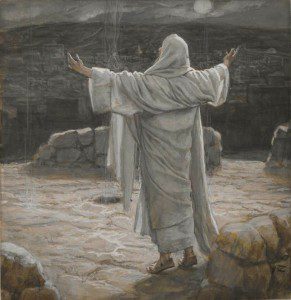And rising very early, going out, he went into a desert place: and he prayed. Simon and those who were with him pursued him and on finding him said, “Everyone is looking for you.”
– Mark 1: 35-37
Years ago a local church put on Andrew Lloyd Webber’s (and lyricist Tim Rice’s) rock opera, Jesus Christ Superstar. If you have never seen it, it is quite the ride with full-throated 1970s-era rock anthems centering on the fallen disciple, Judas Iscariot, as he witnesses the events surrounding the last days of Jesus Christ. Now I am not going to get into the controversial issues of taste and interpretation that often accompany this show (and I’m sure disapproving comments are sure to follow), but there is one scene that has always haunted me. The scene, called “The Temple”, finds Jesus in the Temple in Jerusalem healing the the lame, the leprous and the blind. What begins as a hobbled few approaching the tiring Christ becomes a growing mass of desperate humanity calling, calling to their Lord for wholeness. As Christ swings left, then right, then left again to press his healing touch upon the broken masses he reflects on his growing weariness.
My time is almost through
Little left to do
After all, I’ve tried for three years
Seems like thirty, seems like thirty
Fully Divine, yet full human, his physical limits become apparent as the people clamor for him while chanting, calling, begging louder and louder,
See my eyes, I can hardly see
See me stand, I can hardly walk
I believe you can make me whole
See my tongue, I can hardly talkSee my skin, I’m a mass of blood
See my legs, I can hardly stand
I believe you can make me well
See my purse, I’m a poor, poor manWill you touch, will you mend me Christ?
Won’t you touch, will you heal me Christ?
Will you kiss, you can cure me Christ
Won’t you kiss, won’t you pay me Christ?
The scene grows chaotic. The Christ is obscured, eclipsed, consumed by the masses. And then he says it. Exhausted, overwhelmed and, perhaps even scared, Webber and Rice’s Jesus Christ impulsively yells,
Ooo, there’s too many of you
Don’t push me
Oh, there’s too little of me
Don’t, don’t crowd me, in the crowd me
Oh, heal yourselves!
Whoa.
Now, clearly, that was never something I read in the Bible. Yes, Christ would turn over money changers’ tables, call Pharisees and Scribes hypocrites, and even tell Peter to “get behind me, Satan”, but he never exhibited frustrated impatience with the desperately ill and sinful. So, admittedly, this is literary license (like many other scenes) that Webber and Rice take in their portrayal of Jesus.
But the thing is…I could completely understand if Jesus ever did feel this way. Jesus found himself relentlessly pressed with endless concerns from despairing people who wanted their own needs served while disregarding the greater Truth he had to offer And if that weren’t bad enough, the healed and redeemed often offered little or no gratitude in return. A God who had shepherded his Chosen People through trial after trial, sin after sin now desperately sought to personally teach and show them how to live. And yet he did this knowing full well that the payment he would receive would be a sadistic Passion and crucifixion exacted by a haughty, ungrateful creation.
Why didn’t he lash out? Why didn’t he punish an ungrateful creation?
Because he is God. He is not like me with my excuses, my appetites, and my pride. He is not like the mythological Greek or Roman gods who were portrayed as capricious, cruel and selfish. He is the God of the Good Samaritan, the Good Shepherd and Prodigal Son’s father. He is the God of the Ten Commandments enacting an order of love and respect for God, neighbor and self. He is the God of the meek, the mourning and the persecuted. He is the God of backsliders, misfits and screw-ups.
So when the fully human, fully Divine Christ reached his points of exhaustion and didn’t lash out, what did he do?
He went away. He was quiet. He prayed. He would go to the mountainside, to a solitary place, to lonely, desolate, wilderness places. And he would simply talk with God the Father.
We can all say that we have moments, hours, days when we just want to be alone, we just want some peace and healing, yet sometimes we, like Christ in Mark 1:35-37, are pursued because everyone is looking for us. And the risk is that in response we may fume or lash out. Father Romano Guardini in his book The Art of Praying counsels us to establish a discipline of withdrawal and prayer. How do we do this?
We need to find freedom from the incessant distractions of our everyday lives. Recollectedness is the indispensable watershed between our superficial, frenetic daily lives and a deep, abiding, prayerful communion with God. Recollectedness is preparation for prayer informed by composure and concentration. As Guardini would say, “To recollect oneself is to awaken”. It is to be present. It is to allow our true God-given selves to come up for air after having been submerged (perhaps for years) in the chaotic waters of our everyday lives. And it is a state that we can, and should, cultivate as much as possible. Guardini goes on,
“To recollect oneself means to overcome this deception which springs from unrest and to become still; to free oneself of everything which is irrelevant, and to hold oneself at the disposal of God, who alone matters now.”
“The basic meaning of the word recollected is ‘to be unified, gathered together’. A glance at our life will show how much we lack this aptitude. We should have a fixed center which, like the hub of a wheel, governs our movements and from which all our actions go out and to which they return; a standard, also, or a code by which we distinguish the important from the unimportant, the end from the means, and which puts actions and experiences into their proper order; something stable, unaffected by change and yet capable of development, which makes it clear to us who we are and how matters stand with us. We lack this; we, men of today, lack it more than did those who lived in earlier ages.”
Indeed.
It’s been years since I’ve seen Jesus Christ Superstar. And though the irritable Christ of Andrew Lloyd Webber and Tim Rice is understandable, it is not the ineffable Christ of the Gospels. Though the crowds pressed relentlessly, Jesus loved to incomprehensible degrees. But he also withdrew, prayed and communed with his Father. Surely, he did.
Perhaps we would do well if we did the same.












